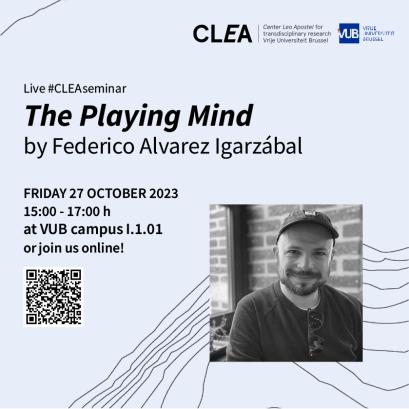Play is an activity that emerges naturally in humans across time and cultures. From early on, children play-fight, play pretend, and participate in games. Grown-ups also play sports, characters in theater and film, card games, and video games. But what does it mean exactly to be at play? Play has been studied primarily in two ways: (1) in terms of the formal characteristics of play activities and playthings and (2) in terms of its social and developmental functions. These approaches have so far failed to yield a working definition of the term and have left a gap with respect to theorizing the mental state of play. This presentation will propose a novel framework for the study of play as a mental state based on philosopher Tamar Gendler’s research on the concepts of alief and belief. This novel approach has the potential to offer a definition of play. It can also frame games and fiction as subsets of play that share the same underlying mental state, connecting objects of study that have so far been understood as disparate due to their formal differences. An improved understanding of the playing mind can shed light on the role of perception and emotion in play, and how it affects our behavior and sense-making abilities.
About the speaker
Federico Alvarez Igarzábal is Researcher and Project Coordinator at the Cologne Game Lab (TH Köln, Germany) for the EU-funded ISEDA project, which aims to combat domestic abuse in Europe through the development of different strategies and tools, including a serious game to train police officers on how to conduct interviews with victims. In parallel, he is working on a research project--the subject of the presentation at CLEA--which aims to conceptualize the mental state of play with theories from philosophy of mind. Federico obtained a Ph.D. in Media Studies from the University of Cologne in 2018. His thesis focused on the temporal aesthetics of video games, both from a formalist and a cognitivist point of view. It was published by transcript Publishing in 2019 under the title “Time and Space in Video Games. A Cognitive-Formalist Approach” (available in Open Access). After his Ph.D., Federico worked as postdoctoral researcher at the Institute for Frontier Areas of Psychology and Mental Health (Freiburg, Germany) in the context of the EU-funded project VIRTUALTIMES. There, he conducted experimental research with psychologists and neuroscientists to further elucidate how video games and virtual environments affect time perception. The main goal of the project was to develop virtual reality tools to treat and diagnose psychopathologies like depression through the manipulation of time perception. As of September of 2023, Federico will be substitute Professor for Media & Game Studies at the Cologne Game Lab.
Speaker's website: https://federicoalvarez.com
Practical
The CLEA seminars are taking place simultaneously at the VUB campus and online (via Zoom) and are open to everyone interested!
When. Friday October 27, 2023 from 15:00 until 17:00 h
Where. VUB campus Pleinlaan 2, 1050 Elsene. Building I, room I.1.01
Online. You can follow the seminar online via Zoom. You may need a Meeting ID and passcode to enter.
Zoom link: https://us06web.zoom.us/j/82757798426?pwd=em9sQlJDVjJYTEFRNk01dEJLWGxGUT09
Meeting ID: 827 5779 8426
Passcode: 122127
Mailing list. If you want to be notified of our next seminars, you can register here to join the CLEA mailinglist.

